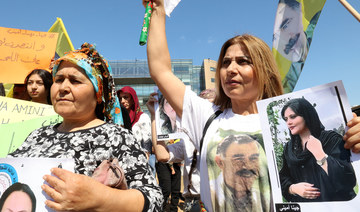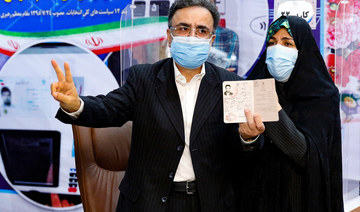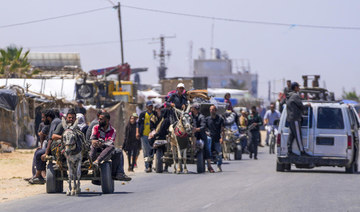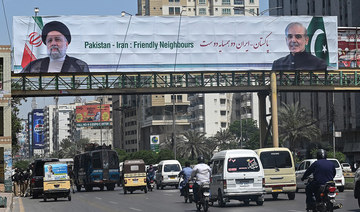DUBAI: Iran suffered a “major disruption” in Internet service Wednesday as calls for renewed protests again saw demonstrators on the streets weeks after Mahsa Amini’s death.
A 22-year-old woman, Amini, had been detained by the country’s morality police, an advocacy group said.
The demonstrations over the death of Mahsa Amini have become one of the greatest challenges to Iran’s theocracy since the country’s 2009 Green Movement protests. Demonstrators have included oil workers, high school students and women marching without their mandatory headscarf, or hijab.
Calls for protests beginning at noon Wednesday saw a massive deployment of riot police and plainclothes officers throughout Tehran, witnesses said. They also described disruptions affecting their mobile Internet services.
NetBlocks, an advocacy group, said that Iran’s Internet traffic had dropped to some 25 percent compared to the peak, even during a working day in which students were in class across the country.
“The incident is likely to further limit the free flow of information amid protests,” NetBlocks said.
Despite the disruption, witnesses saw at least one demonstration in Tehran by some 30 women who had removed their headscarves while chanting: “Death to the dictator!” Those cries, referring to Iran’s Supreme Leader Ayatollah Ali Khamenei, can result in a closed-door trial in the country’s Revolutionary Court with the threat of a death sentence.
Passing cars honked in support of the women despite the threats of security forces. Other women simply continued with their day not wearing the hijab in a silent protest, witnesses said. Demonstrations also occurred on university campuses in Tehran as well, online videos purported to show.
Lawyers also peacefully demonstrated in front of the Iran Central Bar Association in Tehran, chanting: “Woman, life, freedom” — a slogan of the demonstrations so far. The video corresponded to known features of the association’s building. A later video posted by activists purported to show them fleeing after security forces fired tear gas at them.
Videos also purported to show demonstrations Wednesday in Baharestan, just southeast of the city of Isfahan, as well as in the southern city of Shiraz and northern city of Rasht on the Caspian Sea. Gathering information about the demonstrations remains difficult amid the Internet restrictions and the arrests of at least 40 journalists in the country, according to the Committee to Protect Journalists.
Iran’s government insists Amini was not mistreated, but her family says her body showed bruises and other signs of beating after she was detained for violating the Islamic Republic’s strict dress code. Subsequent videos have shown security forces beating and shoving female protesters, including women who have torn off their hijabs.
Khamenei, speaking Wednesday to the country’s Expediency Council, again claimed Iran’s foreign enemies had fomented what he dismissed as “scattered” demonstrations.
“Some of these persons are elements of enemy and if they are not, they are in direction of the enemy,” Khamenei said.
Iranian state television, long controlled by the country’s hard-liners, aired footage it described as women protesting in support of the mandatory hijab across Iran. Only Afghanistan and Iran mandate the hijab in law and by force.
Anger has been particularly acute in western Iran’s Kurdish regions, as Amini was Kurdish. On Wednesday, a Kurdish group called the Hengaw Organization for Human Rights showed images of closed shops and empty streets in some areas, describing it as a strike by shopkeepers. The group also posted a video it said came from Amini’s hometown of Saqqez, which showed truckloads of riot police moving through the city.
While the demonstrations have focused on Amini’s death, anger has been simmering in Iran for years over the country’s cratering economy. Sanctions over Tehran’s nuclear program have seen a collapse in the country’s rial currency, wiping out the savings of many.
It remains unclear how many people have been killed or arrested so far in the protests.
An Oslo-based group, Iran Human Rights, estimated Wednesday that at least 201 people have been killed. This includes an estimated 90 people killed by security forces in the eastern Iranian city of Zahedan amid demonstrations against a police officer accused of rape in a separate case. Iranian authorities have described the Zahedan violence as involving unnamed separatists, without providing details or evidence.
Numerous videos have emerged of riot police shooting into crowds, with some likely using live fire. Apparently feeling the pressure from the public, Iran’s police chief, Gen. Hossein Ashtari, claimed on state television Wednesday without providing evidence that “counterrevolutionary groups abroad” wore police uniforms and fired into the crowds. He claimed his officers had made arrests of some of those people.
Meanwhile, Iran’s Education Minister Yousof Nouri offered the first confirmation that school-age children had been arrested amid the protests. He declined to offer a figure for those arrest, the pro-reform newspaper Shargh reported, only saying those detained had been put “in a psychiatric center,” not in jail.
Iran sees ‘major’ Internet disruption amid renewed protests
https://arab.news/y6b6w
Iran sees ‘major’ Internet disruption amid renewed protests
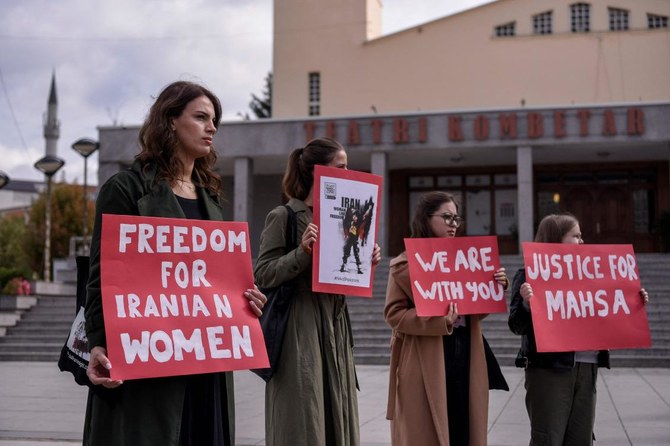
- The demonstrations over the death of Mahsa Amini have become one of the greatest challenges to Iran's theocracy
- Demonstrators have included oil workers, high school students and women marching without their mandatory headscarf, or hijab
Israel lacks ‘credible plan’ to safeguard Rafah civilians, says Blinken

- Blinken said Biden determined to help Israel defend itself and shipment of 3,500 2,000-pound and 500-pound bombs was only US weapons package being withheld
WASHINGTON: US Secretary of State Antony Blinken on Sunday defended a decision to pause a delivery to Israel of 3,500 bombs over concerns they could be used in the Gazan city of Rafah, saying Israel lacked a “credible plan” to protect some 1.4 million civilians sheltering there.
Speaking to ABC News’ This Week, Blinken said that President Joe Biden remains determined to help Israel defend itself and that the shipment of 3,500 2,000-pound and 500-pound bombs was the only US weapons package being withheld.
That could change, he said, if Israel launches a full-scale attack on Rafah, which Israel says it plans to invade to root out fighters of the ruling Hamas militant group.
Biden has made clear to Israel that if it “launches this major military operation to Rafah, then there are certain systems that we’re not going to be supporting and supplying for that operation,” said Blinken.
“We have real concerns about the way they’re used,” he continued. Israel needs to “have a clear, credible plan to protect civilians, which we haven’t seen.”
Rafah is hosting some 1.4 million Palestinians, most of them displaced from elsewhere in Gaza by fighting and Israeli bombardments, amid dire shortages of food and water.
The death toll in Israel’s military operation in Gaza has now passed at least 35,000 Palestinians, according to Gaza’s Hamas-run health ministry.
The war was triggered by the Hamas-led attack on southern Israel on Oct. 7 in which some 1,200 people were killed and more than 250 people taken hostage, according to Israeli tallies.
Israel says 620 soldiers have been killed in the fighting.
Dubai laboratory develops AI technology to detect Legionella bacteria

- The AI system works by pinpointing live colonies of the bacteria
DUBAI: Dubai Central Laboratory has developed an artificial intelligence technology able to detect Legionella pulmonary bacteria, the first of its type in the Middle East region, the Emirates News Agency reported on Sunday.
The system works by pinpointing live colonies of the bacteria, which causes a variety of acute respiratory infections, and delivers examination results with an accuracy rate in quantifying bacterial counts of 99 percent, the report said.
The technology also streamlines work processes by reducing reliance on laboratory supplies, leading to faster completion times.
“This revolutionary method of detecting Legionella pulmonary bacteria is among the latest to be accredited globally by the European Water Testing Network. It also has a certificate of recognition from AOAC International,” Hind Mahmoud Ahmed, director of the Dubai Central Laboratory Department, said.
“The technology is very accurate and quick to produce results, typically needing 48 hours as opposed to the 14 days that traditional methods require.”
Laboratories conduct more than 100,000 tests every year to ensure the safety of various goods sold in Dubai.
UN chief calls for ‘immediate’ Gaza ceasefire, hostage release

- Israeli strikes on Gaza continued Sunday after it expanded evacuation order for Rafah operation
- Gaza war tearing families apart, rendering people homeless, hungry and traumatized, says UN chief
KUWAIT CITY: UN Secretary-General Antonio Guterres on Sunday urged an immediate halt to the Israel-Hamas war in Gaza, the return of hostages and a “surge” in humanitarian aid to the besieged Palestinian territory.
“I repeat my call, the world’s call for an immediate humanitarian ceasefire, the unconditional release of all hostages and an immediate surge in humanitarian aid,” Guterres said in a video address to an international donors’ conference in Kuwait.
“But a ceasefire will only be the start. It will be a long road back from the devastation and trauma of this war,” he added.
Israeli strikes on Gaza continued on Sunday after it expanded an evacuation order for Rafah despite international outcry over its military incursion into eastern areas of the city, effectively shutting a key aid crossing.
“The war in Gaza is causing horrific human suffering, devastating lives, tearing families apart and rendering huge numbers of people homeless, hungry and traumatized,” Guterres said.
His remarks were played at the opening of the conference in Kuwait organized by the International Islamic Charitable Organization (IICO) and the UN’s humanitarian coordination organization OCHA.
On Friday, in Nairobi, the UN head warned Gaza faced an “epic humanitarian disaster” if Israel launched a full-scale ground operation in Rafah.
Gaza’s bloodiest-ever war began following Hamas’s unprecedented October 7 attack on Israel that resulted in the deaths of more than 1,170 people, mostly civilians, according to an AFP tally of Israeli official figures.
Vowing to destroy Hamas, Israel launched a retaliatory offensive that has killed more than 34,971 people in Gaza, mostly women and children, according to the Hamas-run territory’s health ministry.
UN chief calls for ‘immediate’ Gaza ceasefire, hostage release

- UN chief: ‘The war in Gaza is causing horrific human suffering, devastating lives, tearing families apart and rendering huge numbers of people homeless, hungry and traumatized’
KUWAIT CITY: UN Secretary-General Antonio Guterres on Sunday urged an immediate halt to the Israel-Hamas war in Gaza, the return of hostages and a “surge” in humanitarian aid to the besieged Palestinian territory.
“I repeat my call, the world’s call for an immediate humanitarian ceasefire, the unconditional release of all hostages and an immediate surge in humanitarian aid,” Guterres said in a video address to an international donors’ conference in Kuwait.
“But a ceasefire will only be the start. It will be a long road back from the devastation and trauma of this war,” he added.
Israeli strikes on Gaza continued on Sunday after it expanded an evacuation order for Rafah despite international outcry over its military incursion into eastern areas of the city, effectively shutting a key aid crossing.
“The war in Gaza is causing horrific human suffering, devastating lives, tearing families apart and rendering huge numbers of people homeless, hungry and traumatized,” Guterres said.
His remarks were played at the opening of the conference in Kuwait organized by the International Islamic Charitable Organization (IICO) and the UN’s humanitarian coordination organization OCHA.
On Friday, in Nairobi, the UN head warned Gaza faced an “epic humanitarian disaster” if Israel launched a full-scale ground operation in Rafah.
Gaza’s bloodiest-ever war began following Hamas’s unprecedented October 7 attack on Israel that resulted in the deaths of more than 1,170 people, mostly civilians, according to an AFP tally of Israeli official figures.
Vowing to destroy Hamas, Israel launched a retaliatory offensive that has killed more than 34,971 people in Gaza, mostly women and children, according to the Hamas-run territory’s health ministry.
Iran conservatives tighten grip in parliament vote

- Elected members are to choose a speaker for the 290-seat parliament when they begin their work on May 27
- Conservatives won the majority of the 45 remaining seats up for grabs in the vote held in 15 of 31 provinces: local media
TEHRAN: Iran’s conservatives and ultra-conservatives clinched more seats in a partial rerun of the country’s parliamentary elections, official results showed Saturday, tightening their hold on the chamber.
Voters had been called to cast ballots again on Friday in regions where candidates failed to gain enough votes in the March 1 election, which saw the lowest turnout — 41 percent — since the 1979 Islamic Revolution.
Candidates categorized as conservative or ultra-conservative on pre-election lists won the majority of the 45 remaining seats up for grabs in the vote held in 15 of Iran’s 31 provinces, according to local media.
For the first time in the country, voting on Friday was a completely electronic process at eight of the 22 constituencies in Tehran and the cities of Tabriz in the northwest and Shiraz in the south, state TV said.
“Usually, the participation in the second round is less than the first round,” Interior Minister Ahmad Vahidi told reporters in Tehran, without specifying what the turnout was in the latest round.
“Contrary to some predictions, all the candidates had a relatively acceptable and good number of votes,” he added.
Elected members are to choose a speaker for the 290-seat parliament when they begin their work on May 27.
In March, 25 million Iranians took part in the election out of 61 million eligible voters.
The main coalition of reform parties, the Reform Front, had said ahead of the first round that it would not participate in “meaningless, non-competitive and ineffective elections.”
The vote was the first since nationwide protests broke out following the September 2022 death in custody of Mahsa Amini, a 22-year-old Iranian Kurd, arrested for allegedly breaching the Islamic republic’s strict dress code for women.
In the 2016 parliamentary elections, first-round turnout was above 61 percent, before falling to 42.57 percent in 2020 when elections took place during the Covid pandemic.



